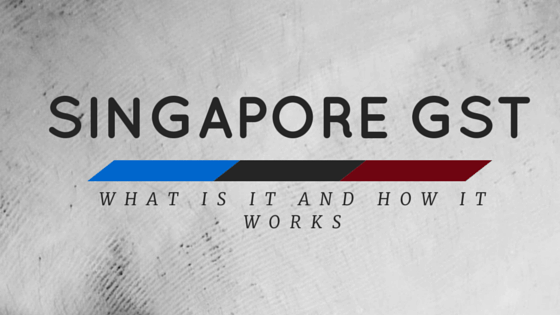
Singapore is known to have the best business environment in the world. According to The Economist’s Intelligence Unit, “Singapore will remain the world’s best location for doing business in 2015‑19. Equal opportunities for local and overseas firms and a favourable attitude towards foreign investment will remain the city state’s biggest strengths.”
One of the key competencies of Singapore as a business destination is its exceptionally robust tax system. Local and foreign enterprises that have gone through Singapore company incorporation can enjoy one of the lowest corporate tax rates in the world along with attractive tax incentives for businesses.
For the economy to become more competitive and avoid total dependency to income taxes, the government of Singapore implements a broad-based consumption tax at a rate that is lower than global standards. This broad-based consumption tax is known as Good and Services Tax, more commonly referred to as GST.
Defining Goods and Services Tax (GST)
GST is the tax that is charged to almost all goods and services that are purchased and consumed in Singapore along with goods that are imported to the city-state. The current GST rate of Singapore is 7% which ranks significantly lower than most countries in the Asia Pacific region.
While most goods and services are taxable by GST, there are GST tax-exempt supplies such as lease or sale of residential properties, majority of financial services, and the supply of investment grade gold, platinum, and silver in Singapore.
How does GST affect my business?
Singapore businesses that are registered for GST are required to tax their supplies and services with GST at the prevailing rate. For example, a consumer purchases or avails of your product or service that costs S$50. When you charge 7% GST, the final cost will be S$53.50—this is known as the output tax. The GST that a business charges and collects from consumers must subsequently be remunerated to IRAS through GST filing.
The amount of GST that a business incurs from the purchases and expenses it sustains in order to operate is called input tax. The input tax is deductible from the output tax which will result to the amount of GST tax that will be refunded to you. This is applicable if your business satisfies the conditions for claiming input tax.
Is my business required to register for Goods and Services Tax (GST)?
Entrepreneurs can personally assess whether their business must register for GST or not. There are two types of GST registration: compulsory registration and voluntary registration. Determining if your business is required to register for GST is simple.
For compulsory registration: You must register your business for GST if its taxable turnover for the past year is more than S$1,000,000 or if is foreseen to have a taxable turnover of more than S$1,000,000 in the forthcoming year.
Otherwise, you may opt for voluntary registration if your business has a taxable turnover is not more than S$1,000,000. The businesses that choose to voluntarily register their business with GST will be entitled to the benefit of claiming input tax or the GST incurred in business purchases and expense.
How do I get assistance in GST filing?
Any business registered in Singapore is required to meet its tax obligations. At Richmond, we have tax experts who are skilled in every aspect of the Singapore taxation system. Our main goal is to address our clients’ specific needs in the most effective and efficient way. Should you need assistance in your business’ GST requirements, we offer competent GST services including the compulsory or voluntary registration, GST computation and reconciliation, preparation of GST F5 form and online submission to IRAS, providing assistance in any GST compliance issues, help liaise with IRAS on GST-related matters, GST advice and planning, GST audit, and cancellation of GST registration.
You may get in touch with one of our specialists for a free consultation or schedule a phone call should you have any queries through our Contact Page





